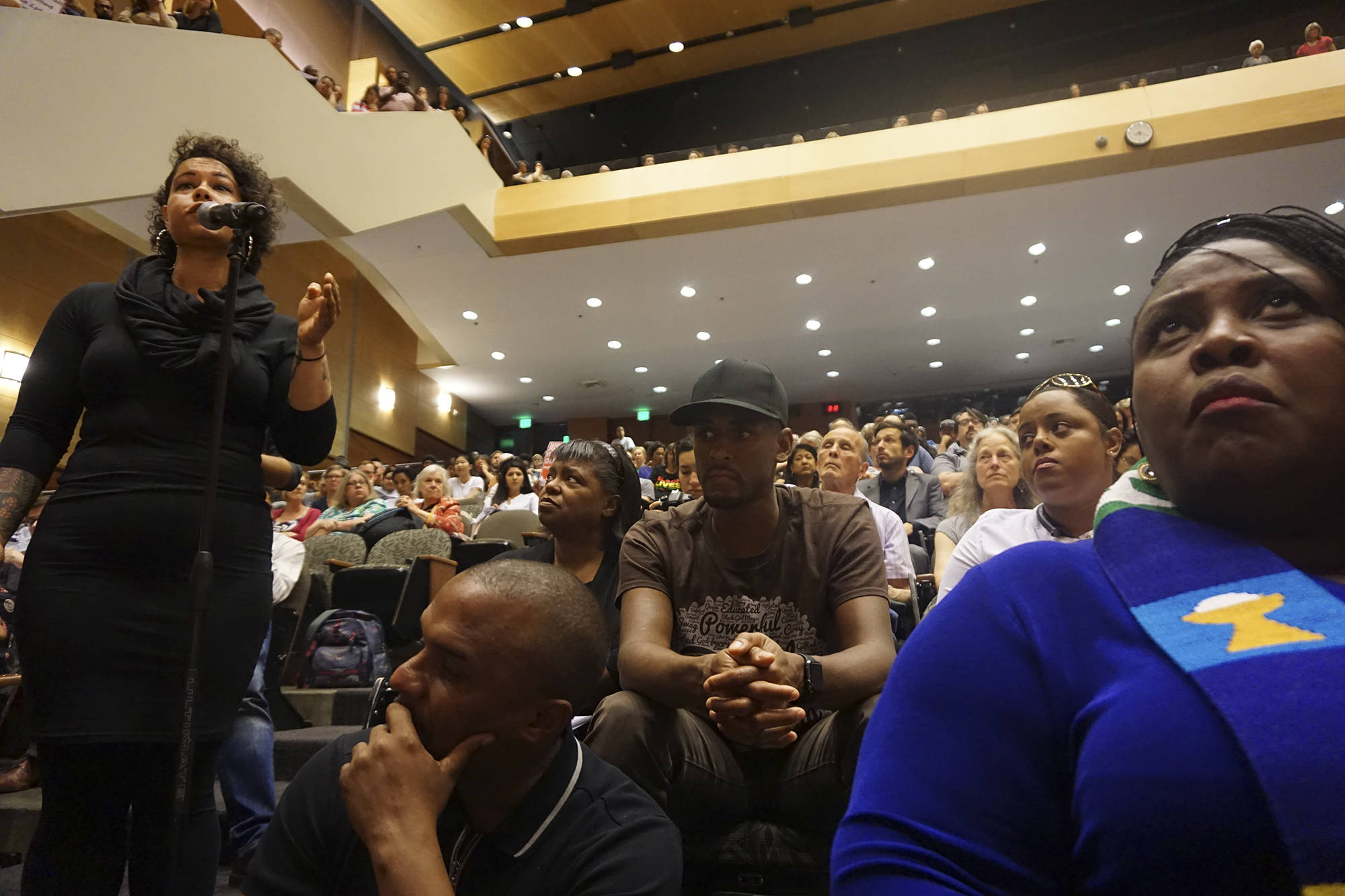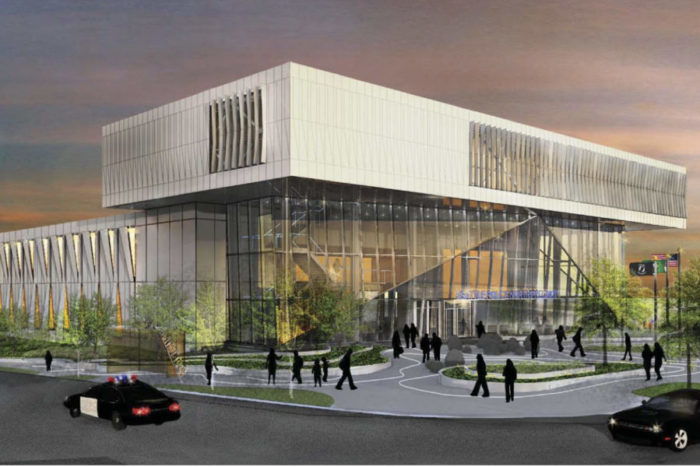“Every time I hear my daughter’s name, it’s not pronounced right,” said Charles Lyles, whose daughter Charleena was shot to death by Seattle police on Father’s Day. “Like my name is Charles, her name is Char-leena,” with a hard tch sound at the beginning.
Seated in his wheelchair, Lyles addressed the audience in Kane Hall at the University of Washington Tuesday night during a public hearing before the Seattle City Council that focused on the death of Charleena Lyles. At times he became emotional as he recalled his daughter’s love of life and her family. “We thought we were going to have a boy,” he said, “and I was so set on naming that kid after me … I named her after me, kind of.
“I’m not going to talk about the police or nothing like that,” he said. “That’s something legal for somebody else. I’m just going to say, my daughter loved life, and there’s no way she’d have [called] the cops to come and kill her … in front of her kids.” Lyles said that his daughter was terrorized by her ex-boyfriend, “and every time she would call the police they wouldn’t even put a restraining order” on the boyfriend.
Police say that Charleena Lyles was advancing on them with a pair of knives in her apartment on June 18 when two officers shot her dead, after she called the police to report a burglery. On their way to meet Lyles, the officers discussed “crazy” statements Lyles had made during a previous encounter with police. In an audio recording of the incident, moments before the shooting abruptly starts, someone—presumably Lyles—says, “Get ready, motherfucker.”
The slaying has inflamed passions in Seattle, which like many cities across the country is struggling to reform its police force. City leaders recently passed, amid great fanfare and backslapping, comprehensive police reform legislation that still needs to be approved by a federal judge as part of the city’s consent decree with the Department of Justice, which followed a 2011 investigation showing excessive force and possible racial bias within the Seattle Police Department. City councilmembers and mayors have made a habit in the years since then-Mayor Mike McGinn first reluctantly signed on to that consent decree of insisting that the bad old days are behind us and that the ongoing reforms are the last push that is needed to fix the police.
The Lyles slaying contradicted that narrative. A small, pregnant woman with young children called the police, who arrived and then a few minutes later shot her to death.
Based on her prior interactions with police, officers knew when they approached Lyles that she struggled with serious mental illness. They’d been trained in crisis intervention techniques. The interaction began calmly enough, but after a few minutes things suddenly escalated and the officers began shouting “Get back! Get back!” Seconds later, they shot her dead.
The bulk of Tuesday night’s hearing was dedicated to public comment, under the facilitation of ACLU WA deputy director Michele Storms. Priority to speak was given to the Lyles family members and then to women of color; because of limited time, no men or white people spoke as public commenters during the three hour meeting. (More than a few men in the audience took loud and repeated umbrage at this fact.) At the end of the hearing, each of the nine City Councilmembers had time to respond.
Rev. Harriett Walden, a longtime Seattle police reform activist who sits on the Community Police Commission, said that she began working on less-lethal weapons as a tool for mitigating police harm two decades ago as a member of Mothers for Police Accountability. Walden is “outraged” that one of the officers was supposed to have a taser but left it in his locker.
“There wasn’t no de-escalation here! They escalated. They escalated!” cried Walden. “They say she had two knives, I say she had two spoons,” she added, highlighting the skepticism many Seattleites feel toward how police portray fatal officer-involved shootings. “They can spin it, I can spin it.”
Speaker after speaker, black woman after black woman, poured out feelings of rage, fear, despair, hope, and love while also delivering demands.
“When I saw the news that she had been murdered by Seattle police, the first thought was, ‘What if that was me?’” said Alice Romeros. “We all have knives in our kitchen,” she said.
“In my community, we’re like, OK, does this mean we don’t call the police, because they might kill us if we call for help?” said Sofia, an African immigrant.
Fear of calling the police was a common theme among speakers. Another theme: Demands to know what city leaders are going to do to ensure that this never happens again—or at least happens less frequently.
“What is going to be different? What is going to change?” said Christina of Seattle Radical Women. “I’ve been here for 18 years, and every time the police” kill someone, she said, there’s been “a hearing like this one” to let the public blow off some steam. “What is going to be different this time? … Are we going to have another hearing like this at the next police murder?”
“I by no means am a cop,” said Madison Mooney. “I have a pre-law degree and I currently work in healthcare. In jobs in both fields I received de-escalation training, and I successfully de-escalated situations where clients and patients were violent, had weapons … I’m not legally able to carry a firearm at work, or a taser, or pepper spray. But if I … a single mother, can de-escalate a situation that I perceive as dangerous, I cannot for the life of me comprehend [how] two grown-ass men, officers of the law” could fail to do so.
“I have to tell my friends that if I ever die in police custody or in their presence, that I was not suicidal,” she added.
Seattle City Council position 8 candidate Sheley Secrest said that black men need to protect black women from police violence.
Mayoral candidate Nikkita Oliver, after twice deferring to other women, asked the council why Mayor Ed Murray and Chief of Police Kathleen O’Toole weren’t present, insisting that even though O’Toole could not discuss the investigation, she could listen to, and participate in, Seattle’s communal grief. (Councilmember M. Lorena González said she had invited O’Toole. “Contrary to popular belief, I do not have subpeona power,” she said. “I cannot make her come to this committee meeting.”) Oliver also criticized SPD for selectively releasing information after the killing, in what some have viewed as an attempt to shape the narrative of Lyles’ death.
One commenter summed up a sentiment shared by many in the room. “I don’t care if she had a knife, I don’t care if she had mental health issues,” she said. “All I care about is she called the police for help, and they murdered her.”
Several council trolls showed up to the meeting as well, including mayoral candidate Alex Tsimmerman and the “Honorable” Michael Fuller. So did council regular Queen Pearl, who delivered a speech in the half-singing style of a gospel minister.
The public comment portion of the hearing was closed out by another relative of Lyles, an older gentleman with a cane who said he served in the Korean War. “These people up here,” he said, motioning to the councilmembers, “I don’t know what they’ll do. But I know what they haven’t done”—that is, prevent Charleena Lyles’ death.
“But I also know what you all haven’t done,” he said to the audience. “You come to these meetings, you’re fabulous, you put your tonsils to work.” But that outrage has to translate into action, he said. “Some of you folks just don’t believe in walking. You don’t believe that you can influence power. … Some of you don’t vote, but what they hell, it’s alright. These people are politicians. If you think you’re going to get something from them by sitting and smiling, it’s not going to happen.
“You have to knock on their doors,” he said, and if they don’t let you in, “knock the door down!”
Each councilmember responded before the meeting closed, each offering their condolences and vowing to double down, somehow, on police reform. Mike O’Brien sounded sad. Storm asked Kshama Sawant to wrap up after the latter started delivering a stump speech. Lisa Herbold promised to continue working “in such a way that we’re doing something differently than what we have been doing,” over the shouts of audience members demanding specifics. Bruce Harrell said we live during “an era of justifiable anger.” Rob Johnson said he was “heartbroken.” Sally Bagshaw said that the hearing had changed her: “I am not the same person who’s leaving here as the one who walked through this door.” Tim Burgess said that he thinks “we’re on the right path” toward police reform, and “we need to make sure that we continue.” Debora Juarez told “those of you who hollered out ‘What are you going to do?’, keep doing that!” And M. Lorena González, whose office organized the hearing, said that “What I have heard is we need more training, training, training” for police officers, as well as changes to state law to make it possible to convict police who make bad kills.
cjaywork@seattleweekly.com
This post has been edited to clarify the responding officers’ statements and to add new information.









